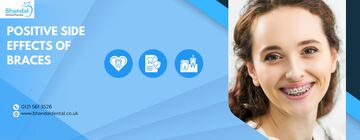
May 9, 2022
What Are The Positive Side Effects Of Wearing Braces?
When patients think about orthodontic treatments, they’re often preoccupied with some of the less attractive side effects. They’re so worried about how they will look and how they will eat that they miss out on some of the positive aspects of braces.
The most obvious positive side effect of getting braces is that you’ll be left with a stunning smile. But there are a few other unexpected side effects which deserve some attention.
Orthodontic treatment can help to address imperfections in your smile such as rotations, overcrowding, problems with your bite and gaps. The treatment typically takes around 6-24 months to complete, so it is a significant commitment.
At the end of treatment, you’ll have a stunning new smile to show off, but there are other benefits to orthodontics that we rarely talk about. In this blog, we’re going to explore who needs braces, the benefits they can expect as a result of wearing their braces, and some other potential side effects to be aware of.
The most important thing for patients starting treatment is awareness. If you know what to expect, you’ll be better equipped to handle it.
Do I need braces?
If your teeth are misaligned, you might be wondering if it is severe enough to warrant treatment. In cases with only small imperfections, you may find to explore faster and less invasive treatments like veneers or composite bonding.
Dental braces are required in the following situations:
Your teeth are crooked or overcrowded
Your teeth are rotated and you struggle to brush and floss them
You have gaps in your smile that are damaging your confidence
Your jaw makes a clicking sound or hurts when you open and close your mouth
You often bite your cheeks.
You struggle to chew food because of a jaw misalignment
The only way to know if braces are right for you is to book a consultation with your dentist. They can take scans of your jaw and teeth to better understand the alignment and then determine if braces are required.

Positive side effects of braces
There are many different orthodontic treatments available. Your dentist will outline any side effects you can expect to experience, including what is normal and what is cause for concern. Below we’ve outlined some of the positive side effects that many adult orthodontic experience. Some of these are completely unrelated to the treatment and will often catch individuals off guard.
1. Improved oral hygiene
A huge part of the success of an orthodontic treatment plan rests on your ability to take good care of your teeth and your braces. This means you have to brush and floss twice a day, without fail.
Many patients report that wearing braces gives them a newfound appreciation for the importance of oral hygiene. Your mouth will be the healthiest it has ever been, which means fresh breath and a glowing smile. And many patients say that this habit stays with them for the rest of their life.
Once you invest in your smile, you are far more likely to take care of your teeth for the rest of your life.
2. Better digestion
When you’re wearing braces, you’ll have to be more careful and selective about your food choices. And if you’ve struggled with jaw alignment in the past, wearing braces could help you to chew your food properly for the first time.
Proper chewing technique is essential to the digestion process. Chewing is the first step in a long process of digestion, and getting this step right can help you extract more goodness from your food while also giving you more enjoyment from eating. In extreme cases, wearing braces can help you to take control of indigestion problems.

3. Weight loss
This is one of the most unexpected side effects of wearing braces. Some patients report losing weight as a result of better food choices. When you’re wearing braces, snacking between meals becomes a lot more effort. This might lead you to cut out unhealthy between-meal snacks to help keep your braces clean.
Even those with removable braces often report a change in their eating and snacking habits. Since you have to remove and rinse your clear aligners after every meal, you might find yourself cutting out your 11 am and 3 pm biscuit break. Many will also cut out all beverages except for water, which can help you to cut back on empty calories.
4. Break bad habits
There are plenty of dental-related bad habits. From using your teeth as a multi-tool to biting your nails. But when you’re wearing braces, you’ll be more aware of your dental health. This could be enough to make you stop these bad habits. Some people also find that braces help them to stop smoking, as they don’t want the nicotine to discolour their aligners or brackets.

Potential problems to look out for
Alongside these unexpected side effects, there are some short-term side effects that might impact your day-to-day life. Sometimes, these side effects can indicate that something could be wrong with your treatment.
It can take a few days to get used to your braces. Your dentist will let you know what is normal and what isn’t. You might notice the following side effects while wearing braces. While some are completely normal, others could indicate that your treatment isn’t going to plan.
Changes to your speech – It can take some time to get used to speaking while wearing braces. Practice will improve your speech in time.
Gum and tongue irritation – This could be a sign that the wires from your braces need adjusting, or that your removable aligners don’t fit correctly.
Difficulty eating – You may need to adjust your diet and stop trying to eat foods that give your trouble.
Slight discomfort – Discomfort after adjustments or changing your aligner trays is normal, but if you are in a lot of pain from changing aligner trays, this could be a sign that you aren’t wearing them enough.
Tooth decay – You should never suffer tooth decay while undergoing orthodontic treatment, so this will need urgent intervention.
Inflamed gums – Sore and bleeding gums could be a sign of gum disease, which suggests you aren’t brushing your teeth often enough. It’s time to revisit your oral health routine and make improvements.
If you’re interested in exploring your orthodontic options, get in touch today to book your free consultation today!
Join the practice
We offer excellent care and advice regarding our wide range of treatments to all of our patients.
Contact our main practice
0121 561 3526Find your nearest practice
Related articles
You may also be interested in
